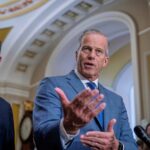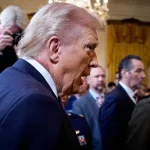
Members of the House committee on China painted a bleak picture of China’s rise on the world stage and highlighted a multitude of long-standing policy failures toward Beijing during its first prime-time hearing Tuesday.
The hearing, which gave an overview of the panel’s upcoming flurry of investigations into China, issued a clarion call for revamping the United States’s strategy toward Beijing. Speakers outlined a series of complex, multifaceted threats from China ranging from human rights, trade, military, and geopolitical machinations.
CHINA IN THE SPOTLIGHT: HOUSE TO HEAR IN PRIME TIME ABOUT ‘COMMUNIST PARTY’S THREAT TO AMERICA’
During the prime-time spectacle, panelists heard from four witnesses: Matthew Pottinger, a former National Security Council official; H.R. McMaster, onetime national security adviser to former President Donald Trump; Tong Yi, a Chinese human rights advocate; and Scott Paul, president of the Alliance for American Manufacturing.
Here are six takeaways from the hearing on the “Chinese Communist Party’s Threat to America.”

Taking a harder line on Beijing
Every speaker at the hearing struck a starkly combative tone toward China, imploring the U.S. to undertake a more forceful approach on the economic, geopolitical, military, and human rights fronts.
“While conflict with China isn’t inevitable, fierce economic competition is,” ranking member Rep. Raja Krishnamoorthi (D-IL) said during his opening remarks.
Throughout the hearing, speakers talked about banning TikTok, bolstering military power, decoupling the U.S. economy from China, and being more combative on human rights issues, among other hard-line approaches.
McMaster argued that the U.S. has “underinvested in modernization” in its military for some time as China has developed powerful countermeasures.
“What they have done is tried to figure out how to take apart what they saw as our differential advantages. We need now, and we’ve needed for some time, investments in countermeasures to those countermeasures, but we haven’t been able to pull it off,” he said.
Pottinger dangled the possibility of collaborating with Silicon Valley to undercut the Chinese Communist Party’s domestic internet firewall that inhibits its citizens from voicing domestic dissent or communicating with the outside world.
“This thing that looks so formidable, I think, is actually made of paper mache,” he said. “I think you can punch holes in the great Chinese firewall. I think we’ve not made a concerted effort, a public-private effort with Silicon Valley firms.”
Blast the past complacency
An underlying theme in the hearing was that past policy and attitudes toward China were a massive blunder. Witnesses and committee members took turns lamenting past “self-delusion” that by expanding trade relations with China, Beijing would grow more friendly with the U.S. and begin to liberalize as it started to flourish.
“Multiple administrations and Congresses clung to the assumption in China, having been welcomed into the international system, would play by the rules,” McMaster said. “Reality proved otherwise, but many leaders were slow to overcome wishful thinking and self-delusion concerning the intentions of the CCP.”
“The United States and other nations across the free world underwrote the erosion of their competitive advantages through the transfer of capital and technology to a strategic competitor, determined to gain preponderance economic and military power,” he added.
Looking ahead to the specter of China invading Taiwan, the committee considered what lessons the U.S. could ascertain from the recent war in Ukraine to safeguard Taipei. One of the conclusions was that deterrence and clairvoyance on China’s ambitions are needed.
Economic swindling
Panelists highlighted how China has inflicted real economic pain on the U.S. over the last few decades by leveraging its state capitalist model to coerce intellectual property transfers, assist in the theft of industrial secrets, and deploy currency manipulations. All of this dealt catastrophic damage to the U.S. manufacturing sector.
“After writing a blank check to Beijing, we turned a blind eye to its cheating, time and time again, accepting empty promises to reform with no real consequences. Governors sought out Chinese firms for projects that cost American jobs,” Paul said. “Meanwhile, taxpayer-financed federal research was handed to China.”
“It is a real mistake to give an adversary coercive power over your economy,” McMaster said at one point.
Krishnamoorthi pointed to a graph showing a sharp decline in domestic manufacturing jobs in 2000 after the U.S. liberalized trade relations with China. Rep. Ro Khanna (D-CA) suggested in questioning that the U.S. should consider deploying “government financing” to help bolster domestic industries.
On a hopeful note, Paul said the recent slew of Biden administration sanctions and restrictions aimed at curtailing intellectual property theft have been effective.
“We’ve seen a screeching halt to a lot of U.S. personnel and company involvement in Chinese semiconductor manufacturing, which was the intent of this,” Paul said, noting that the long-term ramifications are unclear.
CHRISTOPHER WRAY SAYS FBI BELIEVES COVID-19 ‘MOST LIKELY’ ORIGINATED FROM LAB LEAK IN WUHAN, CHINA
Wolf in sheep’s clothing
While China seeks to cast itself as a considerate rising power and vehemently denies allegations it is pursuing global hegemony, the speakers made clear they believe Beijing is harboring nefarious intentions.
Pottinger played a clip running through various myths he felt have been promulgated about China, including that Beijing is not seeking to spread its own “autocratic model“ and that the “Chinese Communist Party is communist in name only.”
Paul contended that China’s true intentions center on dominating key global industries and gaining power.
“Its goal is to dominate key industries set global standards, seek opportunity from crisis, and weaken competitors,” Paul told the panel. “Cheating is a core tenant of the CCP’s ambition — stealing intellectual property, cyber hacking, piracy — that caused tens of thousands of factory closures in America [and] $600 billion in IP losses alone.”
Tong, a naturalized U.S. citizen, harkened back to her time in a Chinese labor camp after engaging in pro-democracy activity.
“Under [Chinese President] Xi Jinping’s rule, there is increasing oppression in China, outside China, and enormous U.S. trade deficit,” she said.
Bipartisan consensus
Implicit in the hearing was the emerging bipartisan consensus that China poses a serious threat to the U.S. and that Washington, D.C., must reconfigure its approach. Unlike other House committees in which Republicans and Democrats typically slug it out, the two sides largely complemented each other’s lines of questioning.
At one point, two protesters interrupted the hearing, accusing the committee of “saber-rattling” and amplifying “Asian hate.” Unlike typical eruptions at committee hearings, the demonstrators garnered no sympathy from the representatives in attendance.
Heading into the hearing, there was ample opportunity for partisan sniping amid outrage over the Chinese balloon that drifted across U.S. airspace earlier this month and Democratic criticisms of former President Donald Trump’s attitude toward Chinese leader Xi Jinping.
But both sides largely eschewed divisive digs, though at one point, Rep. Andy Kim (D-NJ) tried to goad Pottinger into wading into the debt ceiling scrum — something he refrained from doing.
CCP vs China
A clear distinction that the panel sought to drill home was the difference between the CCP and the Chinese people. Following Chairman Mike Gallagher’s (R-WI) opening remarks, he played a video outlining a litany of human rights violations that defined the CCP’s rise to power.
“This should remind us that this committee must constantly distinguish between the Chinese Communist Party and the Chinese people themselves, who have always been the party’s primary victims,” Gallagher said.
The video showcased the “Great Famine” that killed millions, the Tiananmen Square massacre, the crackdown in Hong Kong, Uyghur reeducation camps, and other flashpoints in the CCP’s reign, emphasizing the suffering the party inflicted upon its people.
Krishnamoorthi was adamant in his remarks that the U.S. must “avoid anti-Chinese or Asian stereotyping at all costs.”
CLICK HERE TO READ MORE FROM THE WASHINGTON EXAMINER
One silver lining from the hearing was optimism among most of the four witnesses that the U.S. will ultimately prevail over China in the long run when asked by Rep. Ritchie Torres (D-NY). Still, the witnesses emphasized the string of problems on the horizon.
Policy toward China will likely be a top focus in the 2024 election cycle. On Monday, Trump rolled out a trade agenda with China to effectively phase out all Chinese imports of critical goods, which will likely precede proposals from other candidates.







